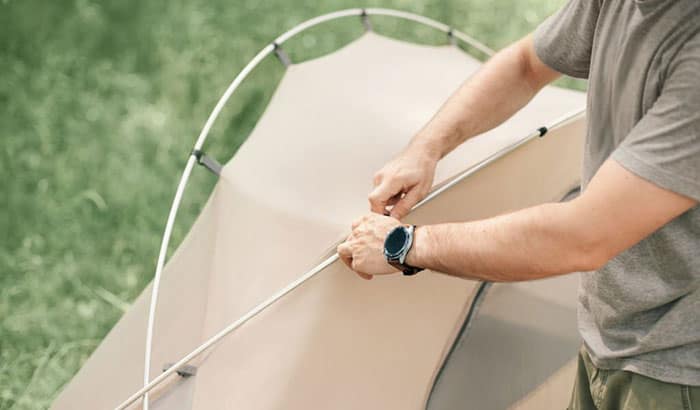When having a tent as one of your camping equipment, you will need to choose what type of tent pole will be used. The tent pole provides the basic structure of the tent, which means having the right one is also essential.
Two of the most popular tent poles today are aluminum and fiberglass tent poles. But, what are the differences between the two? This article will compare and list the differences between aluminum vs fiberglass tent pole and what they bring to the camper.
| Features | Aluminum Tent Pole | Fiberglass Tent Pole |
| Weight | Lighter | Heavier |
| Strength | Stronger | Average |
| Corrosiveness | Prone and Susceptible | Corrosion Proof |
| Price | Expensive | Affordable |
Heaviness
The weight of the tent pole is an important aspect when comparing these two types of poles. Some campers and backpackers prefer a lighter tent pole because it is essential as every weight they bring counts. Usually, backpackers only carry what is necessary to them and the lighter the equipment is, the better.
For the weight, aluminum tent poles are lighter because it is just the way it is. As a type of metal, aluminum is one of the lightest metals and is even three times lighter than steel. In fact, an aluminum tent pole has an average weight of 8.5 lbs per pair which is pretty good for backpackers.
On the other hand, a fiberglass tent pole is heavier because of its properties. The weight of this type of tent pole is perfect for car campers who are not really particular about bringing light equipment into the camp.
Toughness
It is very important for a tent pole to be strong and tough because it supports the tent’s structural integrity. If it does not have the strength to support the tent fully, the possibility of the tent collapsing will be a possibility.
For the aluminum and fiberglass tent poles, it is the aluminum tent pole which has the strength and the toughness to support the overall structure of the tent. This tent pole may be lighter in weight, but it does not mean that it does not have the toughness to do its job.
Aluminum is much stronger compared to other materials such as fiberglass. This material combines malleability and strength to make it useful and versatile. As for the aluminum tent pole, it can carry a heavy load of tent canvas and fabric.
In addition, the strength of the aluminum tent pole is also helpful in protecting the camper from strong winds and rain, which usually happens during the camp. An aluminum tent pole may bend but not break, similar to a fiberglass tent pole.
If the aluminum bends with too much force, fiberglass poles will crack and splinter. Splinters coming from fiberglass can hurt anyone and is dangerous. More importantly, an aluminum tent pole can be repaired when bending. You will need to replace a broken fiberglass tent pole immediately.
Corrosion Resistance Properties
Another way to differentiate between aluminum and fiberglass tent poles is their ability to resist corrosion. When you are in the wilderness, it is normal for the tent poles to experience different types of weather. But when it is raining, it can have a negative effect on the tent pole you are using.
For an aluminum tent pole, corrosion can be possible when it is raining overnight. Camping locations near the sea can also corrode the aluminum tent pole over time. The reason is that aluminum materials are prone to corrosion and rust.
Corrosion and rust can also develop in an aluminum tent pole when constantly exposed to excessive moisture. So, constant rain or camping on a beach can have the possibility of corroding your aluminum tent pole if it is not maintained correctly.
Corrosion can have a negative impact on the structural integrity of the camping tent. So, it is a must for a camper to let the tent pole dry up before keeping it in storage. If the tent pole was exposed expose to seawater, it is a must for you to rinse it with tap water first. Then, let it dry before storing it.
On the other hand, the fiberglass tent pole has the advantage when it comes to the ability to resist corrosion. Since they are made of synthetic materials, the fiberglass tent pole is completely corrosion and rustproof. There will be no adverse effects when constantly exposed to moisture such as rain or seawater.
Price Range
Another way to compare fiberglass and aluminum tent pole is their respective prices. Unfortunately, aluminum tent poles are more expensive because of a much tougher manufacturing process that usually adds to the operation cost when making a tent pole.
Aluminum is a type of metal that requires extraction from mineral deposits on earth. After extraction, the metal will still be processed before it will be used in the actual manufacturing process, thus increasing the operating cost.
On the other hand, fiberglass is a synthetic material which means it is cheaper to manufacture. It is why many of those more affordable tent poles come with a fiberglass tent pole. It is inexpensive and more economical to produce.
Conclusion
Comparing aluminum vs fiberglass tent poles will let you know which is best suited for your camping activity. If you need a more robust and durable tent pole, it is better to use the aluminum-made tent pole. If your camping activity requires only a standard tent pole, then a fiberglass-made tent pole is fine.


